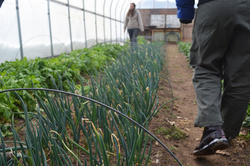A spring Architecture studio sheds light on collaborative place-making and green infrastructure while providing Providence with a much-needed solution to stormwater runoff.
Culture, Cuisine and Connection

“When I cook the food I grew up with in Jamaica, I can feel my mother and my grandmother with me,” says Brown University alumna Lauren Campbell. “Food connects you when there’s no longer physical contact with your homeland.”
“When I cook the food I grew up with in Jamaica, I can feel my mother and my grandmother with me.”
Campbell spoke in early May as part of a virtual community conversation focused on African food and culture. Moderated by Assistant Professor of Interior Architecture Elizabeth Debs—a longtime member of Providence’s Sankofa Food and Culture Initiative—the panel discussion also included Ugandan artist Dora Mugerwa BRDD 15 FD, operations and engagement coordinator at RISD’s Nature Lab; RISD Dining Executive Chef David Gould; and Julius Kolawole, director and cofounder of the African Alliance of Rhode Island.

Kolawole has worked diligently to procure land for the Alliance’s Bami Farm, where fellow African immigrants are able to grow the vegetables they miss from home—like the popular garden egg—and then sell them at local farmer’s markets. The community alliance promotes healthy eating, environmental awareness and education about African foods while providing work for many low-income residents of Providence’s south side.
“We are happy to contribute to the ecosystem of the US and grateful to the volunteers who have helped us,” says Kolawole. “Everybody eats—poor, rich and in between—and we see food as medicine.”

RISD Dining has offered various dishes based on African favorites as part of the series. “One of the greatest opportunities in working at RISD is catering to its diverse population,” says Chef Gould. “We can’t always get authentic African ingredients, so the vegetables Julius’ organization provides offer new possibilities.”
“One of the greatest opportunities in working at RISD is catering to its diverse population.”
The African Alliance recently secured six acres of farmland at Snake Den State Park in Johnston, RI and worked with RISD students and alumni to maximize the land’s growing potential. Thanks to the hard work of alumni volunteers, students in a pre-COVID studio headed up by Architecture faculty member Laura Briggs BArch 82 were finally able to deliver on their designs for an affordable four-season greenhouse and other improvements to the property last fall, and many of them reconvened to share images and renderings with session participants.


“It’s easier to grow in Africa, where the sun is always shining,” says Kolawole. “The greenhouse allows us to grow culturally specific food, and we’re experimenting and learning all the time.”
Briggs says her team also learned a lot through the multidisciplinary collaboration and notes that the students “did a lot of listening to the needs of the African Alliance before helping to develop their master plan.” Included in the plan are social gathering spaces, strategically placed pollinator gardens and beehives and an irrigation system that utilizes collected rainwater.
Recent RISD grad Tyler Mills BArch 17, one of the event presenters, describes the collaboration as “a baptism with dirt rather than water,” adding that he was honored to experience first-hand “the healing nature of architecture and community.”
—Simone Solondz
May 18, 2021


